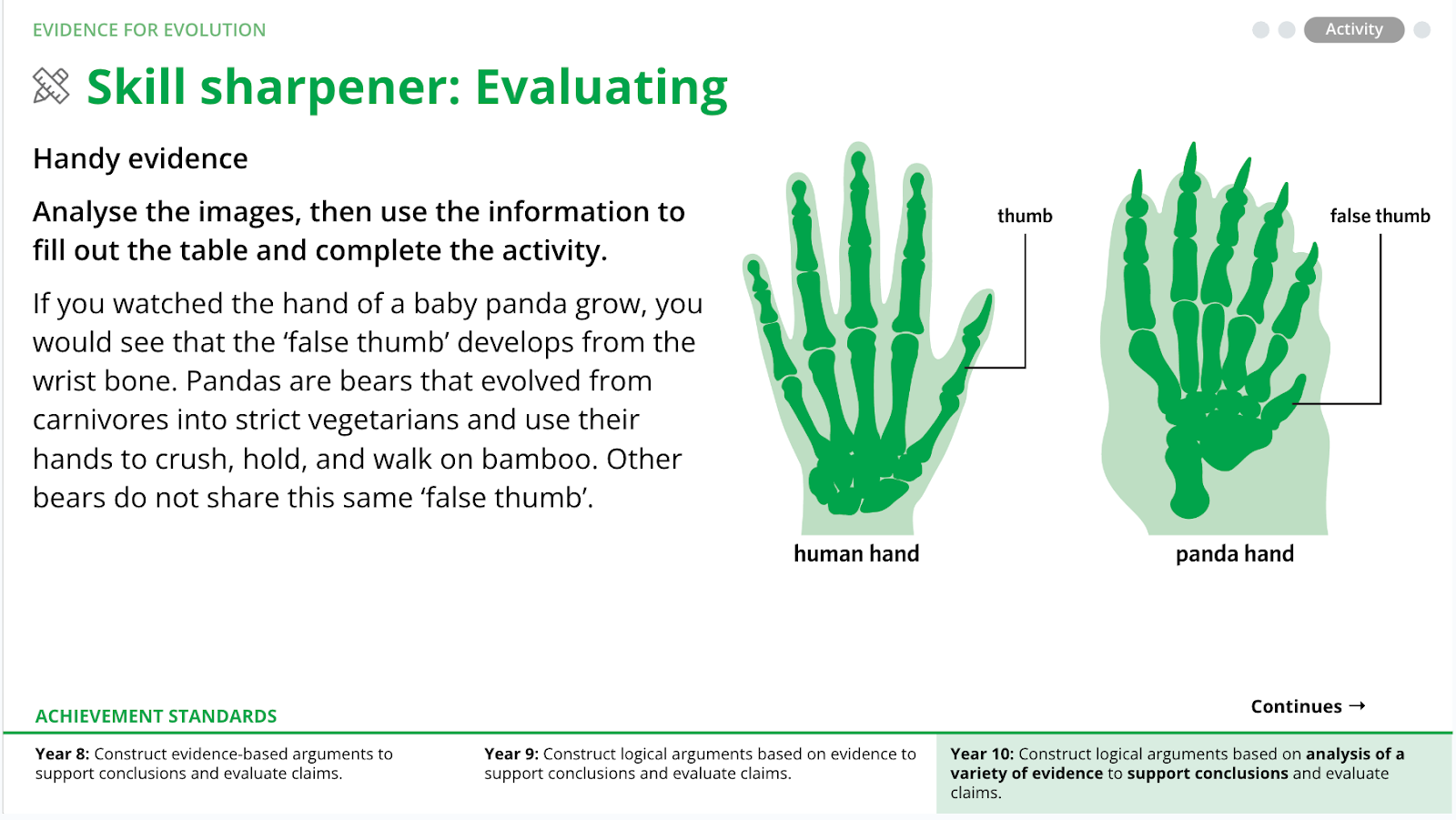Mission possible: tailoring tasks for all agents
In this article, Stacey compares the achievement standards of the Science understanding and Science inquiry skills curriculums. She provides a concrete example from our 7-10 Science resource to show how to align classroom activities with the Science inquiry skills standards by utilising year-level-specific command terms to scaffold and differentiate learning to support student progress.
And we've done the heavy lifting for you, too! Simply by reading through and implementing the discussed achievement standards, you've effectively fulfilled some of your professional learning requirements, and we’ve matched which standards you can tick off, too.
Mission possible: tailoring tasks for all agents
Teaching sometimes feels like playing your favourite songs to someone wearing noise-cancelling headphones. How do we adjust the volume to get through? I empathise with students who shuffle from maths to history and then stumble into my lesson all before lunchtime. It’s a whirlwind of learning, with their brains in overdrive. But, a well-designed curriculum can be a lifeline in this chaos and structuring lessons around achievement standards can simplify lesson planning, differentiation, and assessment.
Tactical science teaching
With 75 action-packed verbs in 7-10 and 20 achievement standards per year, students are expected to nail one achievement standard every two weeks – and that’s just in science. So, rather than overwhelming them by teaching them everything we know, let’s focus on teaching them what they need to know.

When delving into the achievement standards of both the Science Understanding and Science Inquiry Skill curriculums, what I noticed is the contrasting paths they take in Bloom's taxonomy. While the Science Understanding curriculum prioritises surface-level knowledge, the Science Inquiry Skills curriculum advances as they progress through the year levels, requiring deeper cognitive abilities.

Unleashing the power of achievement standards
Harnessing the achievement standards isn't just about ticking boxes; it's about equipping students with the tools they need for success. By aligning lessons with these standards, we're not just teaching - we're guiding, facilitating, and maybe (it’s a big maybe) hitting some high notes along the way.
One key aspect of this alignment can be done by utilising the command terms specific for each year level to scaffold and differentiate for students.
Differentiation plays a crucial role in catering to the varying needs of students. For those performing above the expected level, teachers can provide extension tasks in accordance with the command term and the relevant topic. Conversely, for students who may be struggling, additional support and scaffolding can be provided to help them develop foundational skills. The task does not need to change but can be altered based on the command terms to meet learners where they are at.
Let's take the science inquiry skill of evaluating. One of the achievement standards is to do with formulating an argument. When you see the achievements for each year level side by side, you can see they progress similarly to a rubric with the complexity increasing through the command term.

The art of command
So, how do we put all this theory into practice? Take any topic and create an activity where students can demonstrate their ability to meet this standard. Here’s one I prepared earlier for Year 10 Biology.

.png)
Tailoring to the troops
Our aim is to have no soldiers left behind. Whether they're charging ahead or lagging behind, there's a battle plan for everyone. Extensions for the heroes, streamlined tasks for the middle-grounders, and extra support for the stragglers. It's a one-size-fits-all approach, but with a custom-made twist.
For the overachievers, extend the analysis task to look at further evidence such as other thumb varieties – comparing pandas, chimps, gorillas, humans, and rodents to create a phylogenetic tree to support conclusions and evaluate claims about relatedness.
For the middle ranks, depending on time constraints you could remove the table scaffolding and ask students to write a paragraph to analyse the evidence available to them to conclude whether the hands of humans and pandas are homologous or analogous.
For those needing a little extra TLC, it could be a guided discussion or have the panda column in the table prefilled so they have the evidence available to them already and do not have to analyse, but can instead focus on constructing logical arguments.
Conclusion: Command, and conquer
So, there you have it - our secret weapon in the classroom arsenal. With achievement standards as our compass and command terms as our ammunition, all skills can be embedded in every topic, at least once, providing opportunities for students to hone their skill and monitor progress in different contexts.
References
Australian professional standards for teachers. Available at: https://www.aitsl.edu.au/docs/default-source/national-policy-framework/australian-professional-standards-for-teachers.pdf (Accessed: 06 May 2024).
F-10 curriculum: V9 Australian curriculum (no date) F-10 Curriculum | V9 Australian Curriculum. Available at: https://v9.australiancurriculum.edu.au/f-10-curriculum/learning-areas/science/year-7?detailed-content-descriptions=0&hide-ccp=0&hide-gc=0&side-by-side=1&strands-start-index=0&subjects-start-index=0&view=quick (Accessed: 06 May 2024).
.png)

